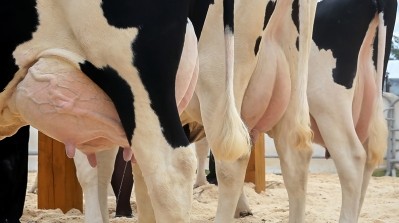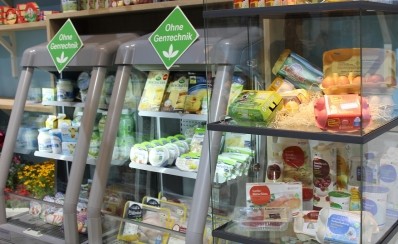German GM free soy feed debate gathers pace: Retailers demand that poultry sector reverts to its previous policy on GM

The leading German supermarkets and the country’s poultry association, the ZDG, have been engaged in intense and often fraught debate since February this year following the poultry trade group’s declaration that it was no longer viable for its members to retain its 10 year old policy of ensuring GM free soy only in their feed.
The retailing powerhouses, such as Edeka, Kaufland, and Rewe, have been driving the campaign to get egg and poultry meat producers to use GM free soy feed again and have demanded they revert to such sourcing from January 2015.
Deadline up for debate
The ZDG said this deadline is not tenable. The association also says the supermarkets should not be exerting pressure on the poultry and egg sector only but should be calling for meat and milk industry wide non-GM soy feed usage.
“We will only find a resolution to this issue when the pork and beef sectors are involved,” Katharina Wolfhard, communications spokesperson for the ZDG, told feednavigator.
And she said the trade group’s position of last February remains unchanged, citing that the risk of contamination from GM soy in GM free soy shipments still exists, often at levels over the permitted tolerance threshold of 0.9% under EU labeling, which, she said, undermines the legal position of poultry producers and puts them at risk of deceiving the consumer.
When asked what could be done to reduce such risks, Wolfhard said: “Contamination can occur at many points along the non-GM soy supply chain, in the field, as well as during transportation and storage. If other German meat sectors started to demand GM free soy in their supply chains, this might incentivize soy producers in Brazil to make additional investments in crop management and logistics to lessen the contaminant threat.”
Not all poultry producers followed the ZDG’s lead in February, with companies like Plukon and Deutsche Frühstücksei reported to have continued to feed GM free soy to their birds.
And, interestingly, ZDG’s CEO Thomas Janning, speaking to German news outlet, Lebensmittel-Zeitung, last week said the association was not ‘categorically’ against the notion of the entire poultry sector reverting to feeding GM free soy, but clarification on certain points was still needed.
The poultry sector is, allegedly, pressing for more widespread use of the GM free label, Ohne Gentechnik (OG), by the German supermarkets on their private label poultry products.
Vote on January 2015 cutoff date
Meetings between the supermarket giants and the poultry manufacturers have been taking place over the past few months, under the auspices of Germany’s QS animal welfare initiative. The next gathering is pegged for mid-September, when a vote on the January 2015 deadline is expected. Under QS rules, the vote must be unanimous.
And Jochen Koester, board member of the German Association of Food without Genetic Engineering (VLOG), reckons the motion will carry undisputed.
“Evidently the retailers will be for it and some of the major German poultry players are already using GM free soy in their feed so the proposal is more than likely to get full support,” Koester told this publication.
Premium cost coverage
And he believes the retailers will be only too willing to cover the extra costs associated with the premium attached to GM free soy. The ZDG had also alluded to the hike in sourcing costs, back in February, as another reason that the industry had decided to stop using GM free soy.
Koester said the premium now averages $75 to $80 per metric ton of GM free soy. At its peak in 2013, it was hitting $150 per MT.
“The lower premium indicates there is a significant volume of non-GM soy on the market. And it shows that solutions that have been put in place over the past 12 months or so to get around the logistic logjam in Brazil caused by increased demand from China for GM soy are working,” said the VLOG representative.
Swedish switch?
In May this year, the Swedish dairy sector said it too was looking to migrate away from the use of non-GM soy, citing the costs associated with sourcing the feed ingredient.
The Sweden farming industry has, generally, maintained a non-GM policy for the past few years.
However, Hilda Runsten, environmental and climate expert at Swedish dairy trade association, LRF Mjölk, told feednavigator then that dairy producers are questioning the continued reliance on the use of non-GM soy due to increasing cost pressures.
She said the higher premium associated with non-GM soy is proving a burden for the sector, and, in tandem, there are ever decreasing quantities of the GM-free variant every year, she said.
Consumer input
Claes Johansson, head of sustainable development at Swedish agri-group, Lantmännen, said the debate on migration to the use of non-GM soy in feed has included all livestock industry stakeholders in Sweden but has not, as yet, involved consumer representative groups.
“It would be difficult at this stage to gauge the reaction of consumers in Sweden to a move away from an industry pledge to use GM free soy in feed but as it is, 50% of beef meat consumed in Sweden is imported, with the majority of that produced using GM soy inputs,” he told us in May.
Johansson doesn’t expect to see an immediate switch to GM soy in feed nor does he expect all livestock sectors to make the policy switch.
“I don’t think we will see a migration to GM soy usage across the board nor will it happen overnight. I think such change will be gradual. A likely scenario will be that some producers will see a value in retaining a GM free feed policy and could exploit that in their marketing,” he said.










